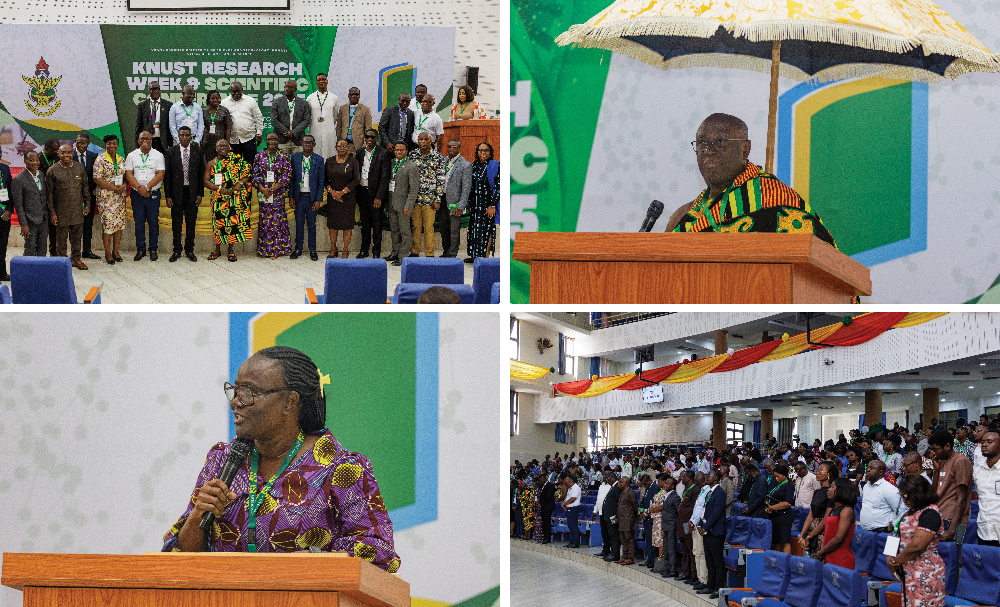The Chairman of the Governing Council of the Kwame Nkrumah University of Science and Technology (KNUST), Akyamfuor Asafo Boakye Agyemang-Bonsu, has reaffirmed the University Council’s commitment to creating a governance framework that empowers researchers to translate ideas into impactful outcomes.
Speaking at the opening ceremony of the 2025 KNUST Research Week and Scientific Conference, Akyamfuor Asafo Boakye Agyemang-Bonsu commended the University’s strides in academic excellence and called for a transition from excellence to eminence in research and innovation.
“My 10-year vision for this university is to move KNUST from Excellence to Eminence. Excellence is publishing a brilliant paper; Eminence is shaping national policy through your research,” he stated. “Excellence solves today’s problems; eminence creates solutions for generations.”
The Council Chair emphasized that KNUST has evolved from being a national leader to becoming a global benchmark for quality education and innovation. He announced that the governing Council is spearheading some frameworks to empower this transition.
‘‘We will establish Multi-disciplinary Grant Challenge Institute; Build pathway from Laboratory to the World; establish Innovation Research Endowment Fund to support groundbreaking projects and sustain research impact,’’ he shared.
He urged researchers to bridge the gap between brilliant ideas and real-world impact, ensuring that ideas are translated into tangible outcomes that shape policies and drive economic development.
“The governing council is creating a framework for eminence. Your charge is to use it to transform lives,” he said.
The 2025 KNUST Research Week and Scientific Conference was held under the theme “Empowering Researchers to Achieve Impactful Outcomes.”
In her remarks, the Vice-Chancellor, Professor (Mrs.) Rita Akosua Dickson, called for stronger collaboration between academia and industry to ensure that research outcomes are translated into practical solutions that improve livelihoods.
She appealed to industry players to collaborate with the University to commercialize innovative projects, stressing that “KNUST remains open to partnerships that drive Ghana’s development.”
Professor Dickson reiterated KNUST’s mission to advancing knowledge in science and technology through its thematic areas. “Our research must be relevant, translational, and impactful from the lab to the community, from ideas to prototypes, and from prototypes to national transformation,” she emphasized.
She expressed gratitude to researchers for their relentless efforts, describing them as the driving force behind KNUST’s research excellence.
“We see your sleepless nights, the hard work behind every grant application, and we say thank you. Your sacrifices keep our research agenda alive,” she stated.
Speaking on behalf of the Minister for Education, the Deputy Director in charge of Tertiary Education, Mr Fred Asa Kisiedu reaffirmed the Ministry’s commitment to supporting research and innovation as critical components of Ghana’s educational transformation agenda.
The Minister commended KNUST for its continuous leadership in advancing research and innovation in Africa.
“Research lies at the heart of national progress. Every great nation has advanced through the power of inquiry, discovery, and innovation,” he stated. ‘‘KNUST as one of Ghana’s leading centres of research excellence has over the years demonstrated remarkable dedication to generating new knowledge that drives socio-economic transformation.’’
He described KNUST’s Research Week as a vital platform for fostering collaboration among academia, industry, and policymakers, while showcasing how research can be translated into real-world solutions.
He said that to achieve impactful outcomes, research must go beyond academic papers and conferences, it should find expression in the lives of people. The true test of research is not merely novelty, but its relevance and contribution to the progress of society,” he stated.
He added that the ministry of education remains steadfast in its commitment to promoting research and innovation as an integral component of the educational transformation agenda. ‘‘With ongoing partnerships and collaboration with academia and universities, the ministry is working to strengthen research funding mechanism, enhance postgraduate research training and facilitate partnership between academia, industry and government agencies,’’ he said.
He assured of the Ministry’s continuous partnership with KNUST. ‘‘We will continue to work hand in hand with KNUST to ensure that the outcome of your research fits directly with the national policy framework and the development agenda,’’ he assured.
The representative applauded the University’s dedication to empowering researchers for national development and urged participants to reflect on how their work contributes to improving lives.
“Ask yourselves, how does my research make a difference? How does it empower others? That is where true impact lies,” he concluded.
















